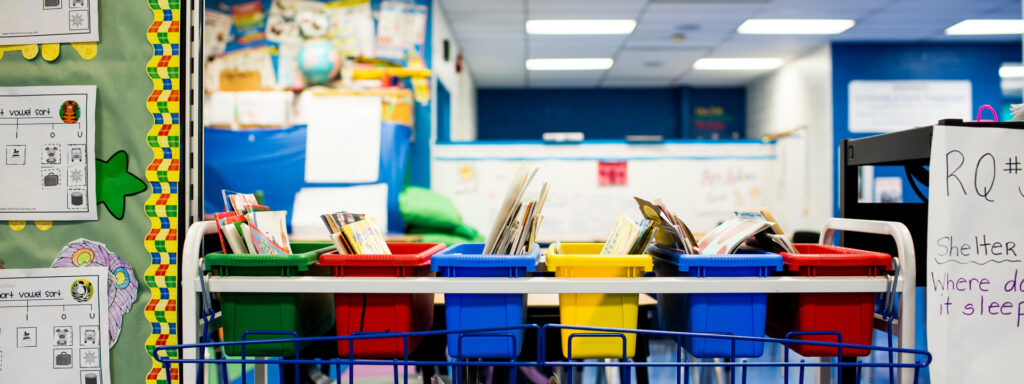I became a special education teacher because of a friend I made in high school: Fred. Though we’d attended school together since freshman year, I only met Fred (not his real name) near the end of my senior year, when we had art class together. He wasn’t like many of my other peers; he didn’t communicate in ways that were familiar to me. I’d ask him questions but wouldn’t get a response. I’d tell him about my day, and he’d say almost nothing in return. After a few weeks in class together, Fred began sitting next to me, walking with me in the hallway, and quietly laughing when I cracked a joke. He had an ability to memorize and recall information unlike any I’d seen before, and would recite Disney movies from beginning to end, fully in character. Fred was brilliant, and I couldn’t help but wonder why I hadn’t met him sooner.
When I asked my teacher about this, she explained that students with disabilities weren’t included in general education classes until our senior year.
As it turned out, Fred was on the autism spectrum—something I didn’t realize at the time. As a special education teacher many years later, though, I thought often of Fred’s experience—and of the experiences of countless other students who spend the better part of their pre-K-12 experience learning in isolation from their peers. Certainly, there are some circumstances in which self-contained special education classrooms are necessary and positive spaces. But too often, for kids like Fred, separation means they’re not getting access to the academic, social, and emotional challenges they deserve. And it means that students in general education classrooms—like the ones I was in before I met Fred—are missing out on the many contributions made by students who learn and think differently.
As a teacher, and now on the administrative side as Indianapolis Public Schools’ Special Education Director, I consider advocating for our students’ rights to full, equitable access to an education a huge part of my job. To me, it’s a matter of civil rights that we do all we can to create inclusive learning communities that celebrate student differences and strive to provide the support students with disabilities need to be successful.
This means providing kids with special needs access to rigorous content and holding them to high standards, as well as thinking creatively about how to give them opportunities to engage in extracurricular activities, AP classes, college and career coaching, and arts classes like the one I had with Fred. It’s our responsibility, morally and ethically, to give all our students what they need to be successful—and of course, success, and the steps it takes to get there, look different for each kid.
In fact, students with disabilities have rights that have long been enshrined in law under the Individuals with Disabilities Education Act (IDEA), and were recently reinforced—and even extended—by the Supreme Court in the Endrew F. v. Douglas County School District case. Legally, the Department of Education must provide resources to states, schools, and even individual teachers to help students with disabilities make progress.
But there are reasons to be worried that those rights and resources could be eroded, or at a minimum not actively protected or implemented with fidelity. IDEA—which has only been in place for about 40 years—created guard rails for the way we educate kids with disabilities, outlining standards, requirements, and protections, while also giving educators the freedom to choose how to teach their students and implement these things in their classrooms. But as the federal government loosens accountability for states’ obligations toward equitable educational opportunities for all kids, students with disabilities are at particular risk. And policy priorities like school vouchers—which theoretically could give parents of children with disabilities more choice in their children’s schooling—can also be risky, because private school settings, for example, have minimal obligations under IDEA.
As we move forward and the landscape shifts, there are a few things my fellow advocates and I are keeping in mind:
- What policy makers do and say when it comes to kids with disabilities can have significant implications for students and teachers. We must hold policy makers accountable for protecting students with special needs. This means paying attention to IDEA and ADA, as well as the way broader education policies—like accountability for different subgroups of students, rigorous standards, and teacher evaluation systems—affect kids with special needs. But it’s not just about big shifts; it’s also about keeping an eye on the things policy makers say (and don’t say) about people with disabilities, as well as the way they use their public platform to show us their attitudes toward people with disabilities. If we want to give students with special needs every opportunity to grow to their full potential—a right now established by the Supreme Court—we have to start from their strengths and give them access to classrooms that are ready and able to build upon those gifts.
- As states, districts, and schools are given more autonomy, it’s crucial we maintain accountability for special education protections. My state, Indiana, is a voucher state with lots of charter schools, open to providing families with a variety of options—but not at the expense of consistent protections for students with disabilities. For example, in 2014 we launched the Innovation Schools Network, which is a group of schools that are able to operate with a great deal of autonomy, while also being held accountable by the district for “agreed upon student outcomes.” While it’s still in its early stages and has room for growth, we are very intentional about ensuring that the rights of kids with special needs are protected, even as we create more flexibility for schools and families.
- Certification requirements, experience, and cultural competency are crucial factors for all educators—especially those teaching students with disabilities. It is the responsibility of all teachers to build relationships and tap into the part of the student that allows them to excel, and for kids who receive special education services, it’s particularly important that teachers have the skills to do this. As we consider how we train and support teachers, and even how we recruit and hire educators who work with students with disabilities (including general education teachers), we need to be sure we’re getting people in the door who are driven to understand their students’ individual strengths and needs, and support them with the skills and resources that enable them to help their students thrive in all aspects of their lives.
I’ve gotten so much out of embracing the traits that make my students unique and teaching them to do the same. I have also seen what happens when students with disabilities are pushed aside and ignored. As teachers, administrators, and mentors for kids, it’s critical we keep our civil rights obligations in mind to ensure equity and access to high-quality education are provided to all students, especially those that have been overlooked for far too long.





